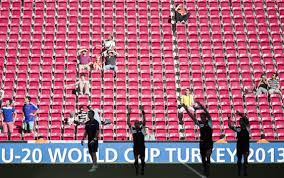By Andrew Warshaw, chief correspondent
June 16 – What was supposed to be a summer of optimism and celebration for Turkish football has turned into a summer to forget. As well as the highly publicised UEFA bans on Fenerbahce and Besiktas over match fixing allegations, the Turkish authorities struggled to get it right when it came to staging the under-20 World Cup, known alternatively as the World Youth Cup.
FIFA have said the empty seats that greeted teams at the 52-game tournament were a disappointment – in a country where football is fanatically followed and which was keen to stage Euro 2020 before Michel Platini decided instead on his revolutionary pan-Continental format.
Official FIFA statistics show that an average of 5,230 fans watched the first 50 games excluding the final and third-place playoff, embarrassing figures that were not lost on organising committee chairman Jim Boyce, Britain’s FIFA vice-president.
Boyce praised the quality of football in the seven host cities but admitted that the crowds – by far the lowest in the competition’s 36-year history – was a “negative point”. ”Turkey has proved that they can organise very smoothly from all other aspects of a major competition,” said Boyce.
“So I honestly hope that does not have an adverse effect on the future. I know that they are keen in the future to host a European Championship and, who knows, also the World Cup. I know how passionate the Turkish football fans are. But for some reason we did not get in the anticipated number of fans at the stadiums.”
With the Turks anxious to stage not only Euro 2024 (having missed out on 2020) but also, of course, the 2020 summer Olympics, Boyce’s words will reverberate around Turkish sport and also raise eyebrows in the corridors of power and FIFA and UEFA.
Ahead of last weekend’s final, local tournament committee President Servet Yardımcı confirmed that the Turkish Football Federation (TFF) would be conducting an investigation into the poor turnout at what is effectively FIFA’s second most prestigious tournament after the World Cup.
“We are working on this issue,” he said. “This is a very disappointing result, there must be reasons for this. Of course we will try to find out the reasons for the low attendance, where we will hopefully learn a very important lesson at the TFF, and we will share these with the public.”
Before the 23-day tournament got under way, Boyce described it as a vital test case for Turkey. “It’s very important the Turkish football public come out and give great support to this tournament,” Boyce said.
They clearly didn’t listen, or listened but didn’t take any notice. Television coverage “showing very small numbers of people attending” games only added to the negativity, Boyce was forced to concede during the event itself.
“There have been some fantastic games, last-minute goals, penalty shootouts, and an average 2.98 goals per game. The people who didn’t turn up, missed something.”
Whether the low turnout was linked in any way with the ongoing domestic match-fixing debacle and general disaffection with the authorities is hard to say but Yardimci all but admitted Turkey had lost a golden opportunity to put itself in the shop window. “This was a very important trial for the TFF, it could be very important for 2024,” Yardimci admitted.
Clearly the Turks have not done themselves any favours and have significant ground to make up, not least as far as being given a major slice of Euro 2020 by Platini is concerned, something the TFF is keen to explore having lost out on hosting the entire event.
“We had the lowest number of spectators although we presented children and families with free tickets,” said Yardimci. “We will find the reason.”
Contact the writer of this story at moc.l1734798868labto1734798868ofdlr1734798868owedi1734798868sni@w1734798868ahsra1734798868w.wer1734798868dna1734798868

